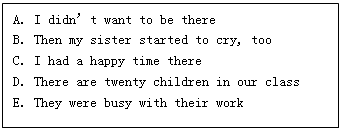题目内容
Kindergartens( 幼儿园 ) may teach you very important things you need to know. Dancy, a 5-year-old boy, saved his father’s life with the skills he learned.
The boy’s father became seriously ill on the way home from a father-son shopping. He couldn’t speak and could hardly move, but he tried hard to stop the car safely. At that point, Dancy used his father’s phone to call his mother for help. The 5-year-old boy tried his best to give her useful information and he was able to tell where they were. Just as he had learned in the kindergarten, Dancy read the letters he saw on a nearby store sign: “F,U,R,N,I,T,U,R,E.” But that wasn’t enough for his mother to find them. Then he added that they were near a bridge. Finally, his mother understood he was talking about a store called Furniture 22 on New Jersey’s Route22.The mother called 911 and the father was saved in time.
“He just thought his dad needed help,” Dancy’s mother told the reporter. She also pointed out that her husband was a hero, too. “ It is surprising for him to get off the highway ( 高速路 ) and get himself and his child to safety even when he was so sick,” she said.
Shine, head of the kindergarten, felt proud of his pupil. “ Dancy’s spelling skills helped him seize the moment,” he said. “And that’s the real value (价值 ) of education.”
1.When the father became seriously ill, he and his son were ________.
A.on the highway B.at home
C.in a shopping center D.in a hospital
2.Dancy called ________for help when his father couldn’t speak.
A.his mother B.911 C.Shine D.the reporter
3.The Chinese meaning of the word “seize” in this passage is probably“________”.
A.成功 B.抓住 C.救援 D.失去
4.Which of the following is TRUE according to the passage?
A.Dancy drove his father home.
B.The reporter was really a hero.
C.Shine sent Dancy’s father to hospital
D.Dancy saved his father with his spelling skills.
1.A
2.A
3.B
4.D
【解析】短文大意:这篇短文主要介绍了一个五岁的孩子由于在幼儿园掌握了一些拼读技能,从而在高速公路上救了自己生病的父亲。
1.根据第二段The boy’s father became seriously ill on the way home from a father-son shopping.描述,可知选A。
2.根据第二段At that point, Dancy used his father’s phone to call his mother for help. 描述,可知选A。
3.联系上下文,可知此处指的是丹西的频度技能帮助他把握住了时机。故选B。
4.根据短文最后一段描述,是丹西的拼读技能让她抓住了道路上的关键信息,从而救了他的父亲。故选D。


On a recent day, “Linsanity” is popular all over the world. It’s the combination of “Lin” & “insanity”, referring to the person who made surprising success.
“Lin” refers to Jeremy Lin, an American professional basketball player, with the Chinese name Shu How Lin. He is the first American player with Chinese descent(血统).
Jeremy Lin was born on August 23, 1988. At the age of 5, He started playing basketball at the kindergarten. He went to Harvard University after playing at Palo Alto High School in California. He graduated in 2010 and joined the Golden State Warriors, an NBA team in California. In late 2011, Lin moved to another team - the New York Knicks at the very end of the year. The Knicks added him to their starting lineup(阵容)that month. He began averaging more than 20 points a game and leading the team to a series of wins.
Here is his career statistics(统计表).
NBA Regular Season Accurate as of February 20, 2012
| Year | Team | GP | GS | MPG | FG% | 3P% | FT% | RPG | APG | SPG | BPG | PPG |
| 2010–2011 | Golden State | 29 | 0 | 9.8 | 0.389 | 0.200 | 0.760 | 1.2 | 1.4 | 1.1 | 0.3 | 2.6 |
| 2011–2012 | New York | 19 | 9 | 23.1 | 0.487 | 0.343 | 0.742 | 2.7 | 5.7 | 1.4 | 0.2 | 14.6 |
FG%: Field-goal 3P%: 3-point field-goal FT%: Free-throw
RPG: Rebounds per game APG: Assists per game SPG: Steals per game
BPG: Blocks per game PPG: Points per game
【小题1】“Linsanity” is an expression referring to the person who ______.
A. made surprising success
B. played basketball young
C. was very popular
【小题2】Jeremy Lin is the first American player with _______ descent.
A. French B. Chinese C. English
【小题3】According to the passage, Jeremy Lin started playing basketball at ________.
A. kindergarten B. high school C. university
【小题4】Jeremy Lin is playing for ________ team in NBA now.
A. the Golden State Warriors
B. the Los Angeles Lakers
C. the New York Knicks
【小题5】Jeremy Lin got 14.6 _________ in Regular Season 2011-2012.
A. PPG B. SPG C. MPG






